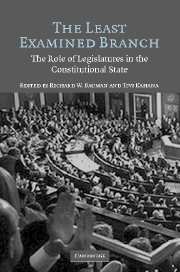Book contents
- Frontmatter
- Contents
- Foreword: Legislatures in the Constitutional State by Amy Gutmann
- Contributors
- New Ways of Looking at Old Institutions
- PART ONE LEGISLATURES AND DEMOCRATIC THEORY
- 1 Principles of Legislation
- 2 An Exact Epitome of the People
- 3 Political Accountability, Proxy Accountability, and the Democratic Legitimacy of Legislatures
- 4 Constitutionalism, Trade Legislation, and “Democracy”
- PART TWO LEGISLATING AND DELIBERATING IN THE DEMOCRATIC LEGISLATURE
- PART THREE CONSTITUTION MAKING BY LEGISLATURES: THE EXPLICIT VERSION
- PART FOUR CONSTITUTION MAKING BY LEGISLATURES: THE IMPLICIT VERSION
- PART FIVE CONSTITUTIONAL INTERPRETATION AND APPLICATION BY THE LEGISLATURE
- PART SIX IS LEGISLATIVE CONSTITUTIONALISM POSSIBLE?
- PART SEVEN THE LEGISLATURE IN DIALOGUE: DOMESTIC AND INTERNATIONAL CONTEXTS
- Index
1 - Principles of Legislation
Published online by Cambridge University Press: 06 August 2009
- Frontmatter
- Contents
- Foreword: Legislatures in the Constitutional State by Amy Gutmann
- Contributors
- New Ways of Looking at Old Institutions
- PART ONE LEGISLATURES AND DEMOCRATIC THEORY
- 1 Principles of Legislation
- 2 An Exact Epitome of the People
- 3 Political Accountability, Proxy Accountability, and the Democratic Legitimacy of Legislatures
- 4 Constitutionalism, Trade Legislation, and “Democracy”
- PART TWO LEGISLATING AND DELIBERATING IN THE DEMOCRATIC LEGISLATURE
- PART THREE CONSTITUTION MAKING BY LEGISLATURES: THE EXPLICIT VERSION
- PART FOUR CONSTITUTION MAKING BY LEGISLATURES: THE IMPLICIT VERSION
- PART FIVE CONSTITUTIONAL INTERPRETATION AND APPLICATION BY THE LEGISLATURE
- PART SIX IS LEGISLATIVE CONSTITUTIONALISM POSSIBLE?
- PART SEVEN THE LEGISLATURE IN DIALOGUE: DOMESTIC AND INTERNATIONAL CONTEXTS
- Index
Summary
A legislature is a place for making law, and because law is a serious matter affecting the freedom and interests of all the members of the community, legislating is an activity we ought to take seriously. It is like marriage in the Book of Common Prayer – not to be enterprised nor taken in hand carelessly, lightly or wantonly, but discreetly, advisedly and soberly, duly considering the purposes for which legislatures have been instituted and considering also the harm and injustice that poorly conceived or hastily enacted legislation may do. In this chapter, I want to consider some principles that I believe ought to govern the activities that take place in and around legislative institutions.
My topic – “Principles of Legislation” – is a common one. But the sense in which I am using it may be unfamiliar. I want to distinguish the principles of legislation that I will be talking about from two other sorts of legislative principles – the principles of a utilitarian like Jeremy Bentham and the principles of a theorist of justice like John Rawls.
The year 1802 saw the publication of a work by Jeremy Bentham, whose first volume was called “Principles of Legislation.” Chapter 1 opened with the following ringing words, less familiar then than they are now:
THE PUBLIC GOOD ought to be the object of the legislator; GENERAL UTILITY ought to be the foundation of his reasonings. To know the true good of the community is what constitutes the science of legislation; the art consists in finding the means to realize that good.
- Type
- Chapter
- Information
- The Least Examined BranchThe Role of Legislatures in the Constitutional State, pp. 15 - 32Publisher: Cambridge University PressPrint publication year: 2006
- 12
- Cited by



